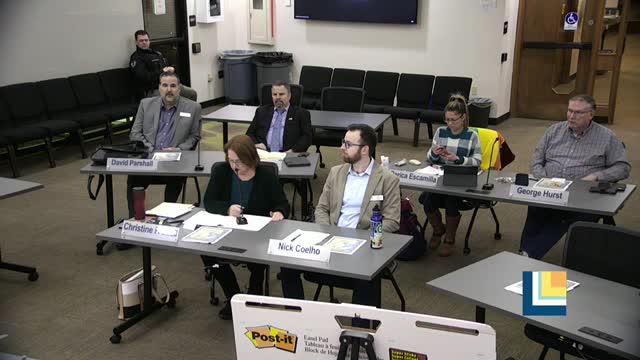Lynnwood council holds workshop on Robert’s Rules led by Anne McFarland
Get AI-powered insights, summaries, and transcripts
Subscribe
Summary
Lynnwood City Council held a work‑session training on Jan. 15, 2025, led by parliamentary trainer Anne McFarland of Jurassic Parliament that reviewed Robert’s Rules of Order and local meeting procedures for council members and staff.
Lynnwood City Council held a work‑session training on Jan. 15, 2025, led by parliamentary trainer Anne McFarland of Jurassic Parliament that reviewed Robert’s Rules of Order and local meeting procedures for council members and staff.
The two‑hour workshop, presented as Item 6(a) on the agenda, covered quorum and open‑meeting requirements, consent‑agenda practice, minutes content, points of order and appeals, the eight‑step motion process, amendments, vote counting and recusal, and recommended public‑comment protocols. McFarland delivered examples and role‑play exercises to illustrate how chairs and members should manage debate and maintain decorum. No formal council votes or policy decisions were taken during the session.
Why it matters: Clear procedures affect how the council conducts public business, how the public is heard and protected under Washington law, and how the body complies with the Open Public Meetings Act. McFarland emphasized that stronger meeting practices can reduce confusion, legal risk, and public frustration while improving the council’s ability to deliberate and act.
McFarland opened by saying the training aimed to “energize you to run effective meetings to serve your community.” She repeatedly urged council members to treat the authority of the group as primary: “the authority of the group is more important than any single individual, even the chair,” she said.
Key points covered
- Quorum and open‑meeting risk: McFarland explained that a quorum is based on fixed positions (not current vacancies) and said the council’s quorum is four. She warned against creating a ‘‘walking quorum’’ by holding serial or private communications that effectively concentrate a quorum outside of a noticed meeting, citing the Open Public Meetings Act and noting past local enforcement and fines.
- Consent agenda and minutes: She advised that consent agendas bundle noncontroversial items for a single vote but cautioned that Robert’s Rules discourages having the council vote to approve expenditures that already occurred (payroll, vouchers); those are typically listed as ‘‘received for filing’’ and approved via the annual auditor’s report. She also said minutes should record official actions, not a running transcript of members’ remarks, though the council may record statements of support or dissent if its rules allow.
- Points of order and appeals: McFarland walked attendees through how members raise a point of order to challenge a procedural mistake and how the presiding officer must rule. She explained that the ruling of the chair can be appealed to the body, described the typical voting sequence for appeals, and illustrated the difference between procedural rulings that may be appealed and clear, unambiguous rules that cannot.
- Motions, amendments and voting: She reviewed the eight‑step process for motions (make motion, second, chair states motion, debate/amend, chair restates and calls vote, announces result) and described permissible amendment types (insert, strike, substitute). McFarland explained that ‘‘call the question’’ (to end debate) requires a two‑thirds vote and that only one main motion may be pending at a time. She also addressed roll‑call order practices, voice votes, and how and when members may change votes.
- Abstention and recusal: McFarland said the council’s rules require members to cast a yes/no vote unless they have a prohibited personal financial interest; in those cases they should recuse and leave the room. She recommended consulting the council’s attorney and materials from the Municipal Research and Services Center (MRSC) for complex conflict questions.
- Public comment: McFarland distinguished public hearings (administrative proceedings governed by statute and local code) from the public‑comment agenda item and urged consistent written rules, announced time limits, and neutral enforcement. She recommended a typical structure (for example, 30 minutes total for comment and three minutes per speaker) but noted councils may set different limits for a meeting by majority vote. She cautioned that limits must be viewpoint‑neutral to avoid First Amendment liability and recommended against prolonged back‑and‑forth exchanges with speakers during public comment.
- Chairing and decorum: The trainer emphasized that the chair controls meeting process and must act firmly but courteously, repeatedly stating procedural steps and recognizing members in turn. She encouraged practices that ensure all members can speak once before members speak again, limit side conversations and crosstalk, require recognition before speaking, and prevent derogatory personal remarks.
Training method and examples
McFarland used fictional role‑play (the ‘‘Dinopolis’’ scenario) to demonstrate common procedural breakdowns and to practice making and processing motions, amendments and appeals. Exercises included a scripted mock debate about raising a downtown parking fee and a later, freeform practice session about how to spend a hypothetical $10 million surplus. McFarland and attendees treated these as illustrative simulations—she repeatedly framed them as teaching tools rather than real council actions.
Follow up and materials
McFarland told the council she would provide reference materials, a short guide on the ‘‘four fundamental guidelines for successful meetings,’’ and sample worksheets for tracking speakers. She directed council members to MRSC materials for legal guidance on conflicts of interest and to consult the city attorney when statutory or complex fiduciary questions arise.
Meeting context and next steps
The session was a work session and training event; council leadership signaled no formal votes or policy changes were decided at that meeting. Staff and leadership will decide whether to propose procedural changes or rule clarifications for future agendas based on the training and the written materials McFarland promised to deliver.
Ending note: The training was presented as professional development for council members and staff to reduce procedural errors, enhance public engagement, and strengthen compliance with Open Public Meetings Act obligations.
